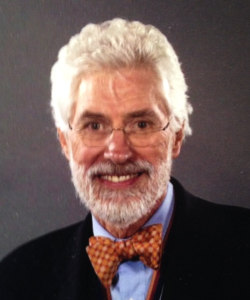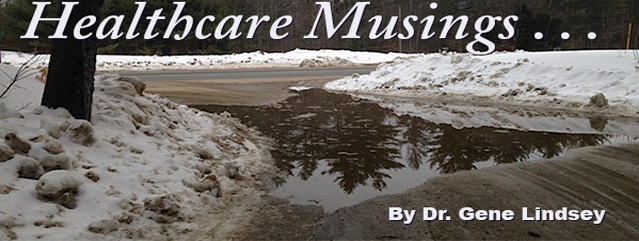Health Care: “The Right of Every Citizen”
I recently had the pleasure to meet Dr. Gene Lindsey, a compassionate and empathetic physician for nearly four decades, who has been a guiding voice in Massachusetts concerning healthcare reform. To be fully informed about the latest happenings in healthcare, I encourage you to read Dr. Lindsey’s blog, where you can also sign up for his weekly newsletter Healthcare Musings. In an email exchange with with Dr. Lindsey, he shared with me his experience visiting his ninety-four-year-old father this past winter. Because I want to understand the aging process, and write about aging here on my website, his story intrigued me. My ninety-one-year-old father-in-law, Tom, passed away not too long ago. So, at this time, topics related to aging and loss are of particular resonance. Please enjoy this excerpt of Dr. Lindsey’s story, “I Can Do it Myself.”
This past February, I traveled to Lincolnton, North Carolina to visit my father and to share with him a celebration of what would’ve been my mother’s 96th birthday, if she were still alive.
My parents “retired” in late 1982 when my Dad turned sixty-two. After twenty-five years of “retirement,” my mother’s health declined in her late eighties, and my Dad transferred more of his time to her care. By 2006, caring for her became more than a full time job, and the medical resources to manage her various conditions didn’t exist in their community. They sold their home and bought one in the Atlanta area near my sister, whose daughter and daughter-in-law were both nurses. In Atlanta there were more specialists, with more services nearby. With the support my sister’s family provided, my parents were able to live independently. My mother survived another six years before she died in hospice care in 2013, two months before her 94th birthday.
During the last seven months of her life, after she enrolled in hospice, she lived a remarkably comfortable existence. Most of the hospice care was in their home – Mom received inpatient hospice care only when my father needed respite, and again at the end. The entire six years was a tour de force, organized by my Dad and sister.
The role of caregiver gave great purpose to both my Dad and sister until my mother died. Not only had my Dad lost his spouse, best friend, and confident of seventy years, but he lost his real purpose for existence. Dad had no social supports in Atlanta other than family. He was intellectually isolated because he had given up his work and social contacts to care for my mother. Despite many offers for grief counseling from hospice, he couldn’t connect in an effective way.
Atlanta wasn’t the place for our Dad, but he couldn’t live alone anywhere else. In May 2013, we gathered in North Carolina at my mother’s grave to honor her on Mother’s Day. My Dad’s neglect of his health was most obvious by his instability on stairs that weekend and his story of a few “slips” at home. When he returned to Atlanta, he fell and broke his hip.
The next six months were pretty dreadful and included a prolonged hospitalization. Our father didn’t want assisted living. My brother agreed to become a caregiver and live with him. He asked only that he and Dad find a home in Lincolnton that allowed each to have space for themselves, and that we figure out how to cover him so he could have a week each month at his home off the Georgia coast, to attend to personal business and spend time with his grandchildren.
To make such a decision is one thing. To execute the move and reestablish support systems is another. By the time of the move, my Dad had a mounting list of chronic issues – many were the result of inactivity from grief, but he still had a long list, including a cardiac pacer, residual problems from a total knee replacement, and late complications from surgery for prostate cancer.
Last May, a year after the broken hip, and as things were settling into a good rhythm in the new home with my brother, my father fell again when he tripped on a curb. He fractured his pelvis and spent six weeks in the hospital, including rehab. All the gains over the last year seemed lost.
The core issue was what part of his condition was due to memory loss and other cognitive issues and what part was situational depression and grief that might improve with the right combination of meds and rehab? Previous attempts to use psychotropic meds had been problematic. It became clear that the depression and cognitive issues would be best managed with counseling. Experience had taught us that the liabilities of meds for anxiety and depression in any but the most miniscule doses far outweighed their benefits.
Healthcare in Lincolnton had changed since my mother was forced to go to Atlanta for care. In the interim, the county hospital was sold to Carolinas Healthcare Systems, a growing non-profit system. My Dad hadn’t been effectively integrated into the system before his second fall, but he was by the time of his discharge from an affiliated rehab. Back at home, he was seen regularly in outpatient rehab, and his emotional and cognitive issues were effectively managed between his PCP and the larger system. When he visited me for a month in August, he could walk a half a mile with a rolling walker, if allowed many stops to rest.
Now, six months later, he walks a mile a day, with a sure gait, though he follows the advice of his physical therapist and never leaves home without his cane.
Earlier this past winter, he walked his daily mile on an indoor track of an athletic facility. Those 18 laps were “boring,” as he clicked them with a counter. Two months ago, an expanded supermarket opened in town, and he discovered that five laps around the perimeter inside the store was a mile. Now, while shopping, he counts his laps by shifting a coin from his left pocket to his right one at the end of each lap.
While I walked through the store with him during my recent visit, the lady in the flower section stopped us on three of our five laps: first to say hello and ask who I was, again to ask my father to pray for her friend who was having her kidney removed, and a third time to ask his advice about how to approach the store’s management about getting more work hours. My father had the time to chat, and enjoyed the opportunity to serve.
The real measure of his recovery is that he’s socially interactive with people outside his family and no longer talks about his life being empty of purpose. He’s active in his church, and writes Lenten essays requested by the minister. He has also spoken with the folks at the local hospice about volunteering and loves to attend “old philosophers” meetings at a fast food eatery most mornings. He’s developed an interest in a homeless man, who is seen regularly around town pushing a shopping cart full of his belongings.
The thematic high point of the trip occurred when we went to get in the car to drive to the store to go for a walk. I offered him a hand, but he refused my help with a curt yet logical: “I can do it myself. I will do it better this time than the last time I did it; and if I do it myself this time, the next time I try, I will be even better!”
I’m reminded of what I was taught in medical school: Grief is a two-year process. I’m also aware that many elderly people die in close proximity to the death of their spouses. I also believe that my father is the great beneficiary of the evolving body of information that’s leading to the improved care for the elderly. My Dad didn’t know how to ask for help and our efforts were well meaning, yet the job is hard and at times feels impossible. But hard is not the same as impossible, and I’m grateful for the medical professionals who appeared on cue when beckoned by a PCP who knows the family and the patient, and shows by his efforts that he cares.
The care my parents have been fortunate to receive, and the support their caregivers have been presented with may not be perfect, but all I need do is think back to the limited resources available not that long ago. The challenge now is to make care that is at least that good the right of every citizen, including the man wandering the streets with the shopping cart, who has a name and a history my father now knows.
 Gene Lindsey, MD, CEO Emeritus of Atrius Health, served as President and CEO of Atrius Health and Harvard Vanguard Medical Associates from 2008 through 2013. Dr. Lindsey has been an internist and cardiologist for almost 40 years, practicing at Harvard Vanguard Medical Associates and its predecessors since 1975. He has a long history of leadership during that time. In 1997, when Harvard Vanguard Medical Associates, a non-profit, 500-physician multi-specialty medical group was created, Dr. Lindsey became the first Chairman of the Board for this new organization. In 2004-2005, when five groups affiliated to form Atrius Health (formerly HealthOne Care System), Dr. Lindsey joined the Atrius Health Board, and in January 2007 became its Chairman, a position which he held until he was appointed as CEO. Dr. Lindsey served on the Advisory Committee to the Massachusetts Health Care Quality and Cost Council, Special Commission on Price Variation, and now serves on the Advisory Committee to the Massachusetts Health Policy Commission. Lindsey received his medical degree from Harvard Medical School and holds a B.S. in Chemistry from the University of South Carolina. He completed an internship, residency, and was a clinical fellow in cardiology at Brigham and Women’s Hospital. Dr. Lindsey is a sought-after speaker on the healthcare topics of payment reform, accountable care organizations, practice innovation, quality and efficiency.
Gene Lindsey, MD, CEO Emeritus of Atrius Health, served as President and CEO of Atrius Health and Harvard Vanguard Medical Associates from 2008 through 2013. Dr. Lindsey has been an internist and cardiologist for almost 40 years, practicing at Harvard Vanguard Medical Associates and its predecessors since 1975. He has a long history of leadership during that time. In 1997, when Harvard Vanguard Medical Associates, a non-profit, 500-physician multi-specialty medical group was created, Dr. Lindsey became the first Chairman of the Board for this new organization. In 2004-2005, when five groups affiliated to form Atrius Health (formerly HealthOne Care System), Dr. Lindsey joined the Atrius Health Board, and in January 2007 became its Chairman, a position which he held until he was appointed as CEO. Dr. Lindsey served on the Advisory Committee to the Massachusetts Health Care Quality and Cost Council, Special Commission on Price Variation, and now serves on the Advisory Committee to the Massachusetts Health Policy Commission. Lindsey received his medical degree from Harvard Medical School and holds a B.S. in Chemistry from the University of South Carolina. He completed an internship, residency, and was a clinical fellow in cardiology at Brigham and Women’s Hospital. Dr. Lindsey is a sought-after speaker on the healthcare topics of payment reform, accountable care organizations, practice innovation, quality and efficiency.


Recent Comments